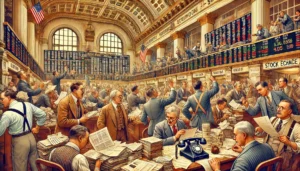
Before the digital revolution transformed the financial world, markets operated in a fundamentally different way—rooted in manual processes, personal relationships, and a slower pace of communication. This era, often overlooked in today’s fast-paced, tech-driven environment, laid the groundwork for many of the practices and principles still in use.
A World of Manual Transactions
In the pre-digital age, all financial transactions were recorded by hand. Ledgers and paper records were the norm, with double-entry bookkeeping serving as the primary method for tracking debits and credits. Every transaction, whether a small local trade or a large bank transfer, required meticulous documentation. This system, while innovative for its time, was prone to human error and demanded a high level of diligence from accountants and clerks alike.
The Central Role of Physical Institutions
Banks and stock exchanges were not just centres of finance but also community hubs where personal relationships played a crucial role. Customers visited their local banks to deposit money, apply for loans, or discuss investment opportunities face-to-face. Stock exchanges operated on physical trading floors where traders shouted bids and offers, relying on a mix of instinct, reputation, and personal trust rather than real-time digital data.
Communication in a Slower Era
Without the instant communication tools available today, information travelled slowly. News of economic events, market fluctuations, or changes in government policy could take hours—or even days—to reach investors. The reliance on newspapers, telegraphs, and word-of-mouth meant that market participants often acted on outdated information, leading to cycles of rapid change followed by periods of correction. This delayed dissemination of data contributed to higher levels of uncertainty and volatility in financial markets.
The Limitations and Challenges
The absence of technology imposed several limitations:
- Speed and Efficiency: Manual processes meant that transactions and record-keeping were inherently slower, reducing the overall efficiency of financial operations.
- Scalability: As economies grew, the sheer volume of transactions began to strain the manual systems. Scaling up operations without digital tools was a significant challenge.
- Accuracy: Human error was an ever-present risk in a system dependent on manual data entry and calculations, necessitating rigorous audits and reconciliations.
Despite these challenges, the era before technology was also marked by innovation. Pioneers in finance developed the foundational practices—such as risk assessment, portfolio management, and regulatory frameworks—that continue to influence modern markets.
Laying the Foundation for Modern Finance
The traditional financial market’s structure, though slow and labour-intensive, fostered deep-rooted trust and local community engagement. The careful, deliberate nature of manual transactions provided a stark contrast to the rapid-fire pace of today’s electronic trading. Yet, many principles from that time remain relevant. The emphasis on thorough documentation, ethical practices, and prudent risk management set standards that persist even as technology continues to reshape finance.
Conclusion
The financial market before technology was a world defined by human interaction, meticulous record-keeping, and gradual communication. While today’s markets benefit from instantaneous data and automated processes, the historical methods of the past remind us of the importance of trust, accuracy, and the thoughtful pace of transactions. Understanding this evolution not only highlights how far we’ve come but also underscores the enduring principles that continue to underpin the world of finance.
13 Responses